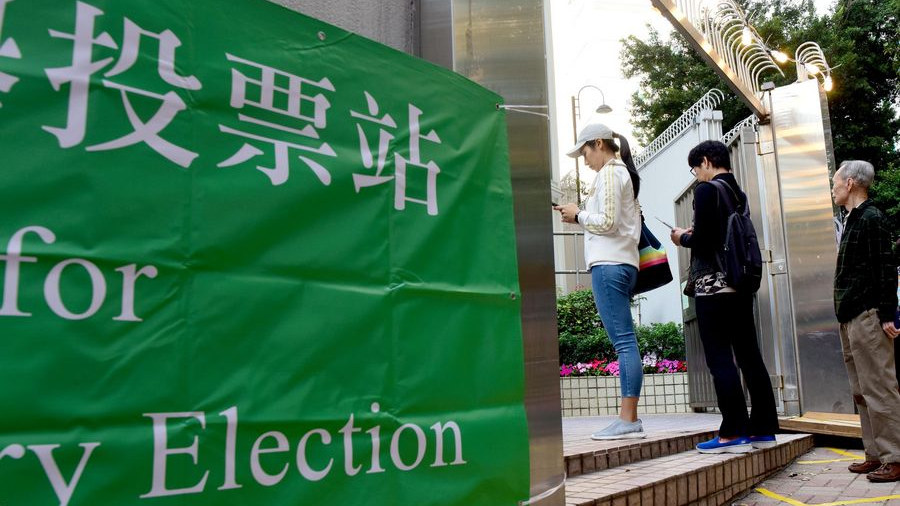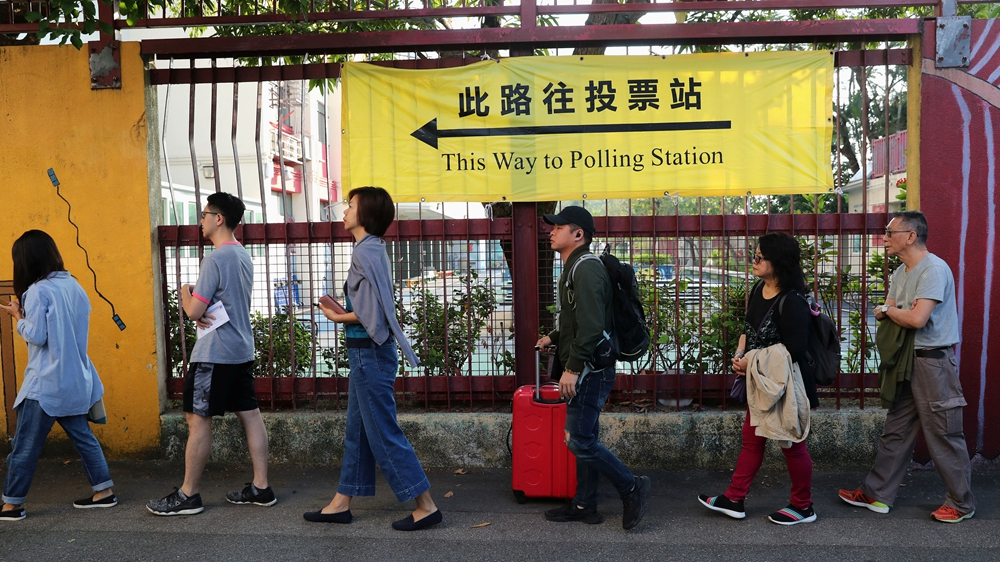
Electors in queue to cast ballots for the 2019 District Council Ordinary Election of the HKSAR, China, November 24, 2019. /Xinhua
Electors in queue to cast ballots for the 2019 District Council Ordinary Election of the HKSAR, China, November 24, 2019. /Xinhua
Editor's note: Tom Fowdy is a British political and international relations analyst and a graduate of Durham and Oxford universities. He writes on topics pertaining to China, the DPRK, Britain and the United States. The article reflects the author's opinions and not necessarily the views of CGTN.
Results of the Hong Kong District and Council elections have shown large gains for the opposition camp at the expense of pro-establishment candidates. Just how did this result come about? How might it be explained? Western mainstream media were quick to frame the results the way they wanted to, largely to score points in their one-sided portrayal of events in the city.
If Hong Kong authorities are to reconnect with locals, then ultimately an empirical approach is needed rather than a purely ideological one. Observing events on the ground in the city and having lived here before, here is how I believe this dramatic result came out:
Greater political mobilization and turnout
The mainstream press are obviously setting out a narrative that a vast majority of the city has overwhelmingly turned to the opposition camp in a revolt against authorities. While undeniably the result speaks for itself, this take is misleading in that it is very simple. Instead, support for the status quo has not collapsed, rather elections in general tend to mobilize greater turnout in the side that feels unhappier and has a greater point to prove; thus giving them the upper hand.
The past few months have seen Hong Kong become more politically active than ever before. More people are engaged, invested and pursuing political matters, with events making it impossible to ignore. People who did not vote previously were now inspired to come out, vote and make their voice heard. Given the nature of the unrest in the city, this inevitably favored the opposition camp.
As a result, one must avoid assuming the pro-establishment force support collapsed. It did not. In fact, from the 2015 local and district council elections the vote total for these parties increased from 700,000 to 1.2 million. There was also an increase in turnout towards them, but the other side were not able to match the surge in the opposition. This leads onto the next point, how the electoral system produces a result that appears to be lopsided.

The election on Sunday saw an unprecedented voter turnout in Hong Kong. /VCG Photo
The election on Sunday saw an unprecedented voter turnout in Hong Kong. /VCG Photo
The first past the post system
The electoral system of first past the post is a "winner takes all" model, in contrast to voting systems that are proportional in delegating seats. That is, when one candidate receives more votes than the other, no matter by how many even be it 1 (and not requiring an absolute majority of the total votes cast), they receive the seat in question and the runners-up get nothing.
This system is implemented in the Hong Kong district council elections. While 57 to 43 percent is a comfortable winning margin, the seat tally total nevertheless makes the result appear more one sided than it actually was. The two main camps were separated by 400,000 votes, with 1.7 million against 1.2 million. Yet because of the system, the seats were allocated 59 to 388. This inevitably overclouds many close races where the winning margin may have otherwise been very slim. Thus, through greater turnout and mobilization as set out above, many opposition candidates were able to win the decisive races.
The role of 'Hong Kong identity'
Of course so far we have provided structuralist explanations, and not fully covered the question of "why" people voted the way they did. What mobilized one side to come out in greater numbers than the other? One answer is "Hong Kong identity" – the sense of local exceptionalism that advocates a sense of exclusivity on a political, social and cultural level from the mainland. This of course favors the opposition camp.
Events such as the fugitive bill and the broader protests have in fact mobilized people who advocate this perception quite strongly, also giving some induced tolerance to violence. Thus, if we merge this with the factors above, people driven by this were politically mobilized in greater numbers and felt they had a message to drive home like never before. Thus, the increased political role of this identity changed the election.
Conclusions: A changed Hong Kong
With all this, the answer to how this result came about is the decisive factor of Hong Kong becoming an increasingly politically conscious society and the stakes rising. Political discontent and sentiment of identity in the midst of a long set crisis drove greater turnouts and momentum towards the opposition camp.
In doing so, support for the status quo did not collapse. However, moving forward Hong Kong authorities now have to win over this newly political active society trust wise, while also placing greater emphasis on mobilizing their existing support.
(If you want to contribute and have specific expertise, please contact us at opinions@cgtn.com.)